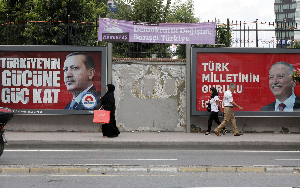Erdoğan Wins Presidency With an Unsustainable Majority
By Micha’el Tanchum (vol. 7, no. 14 of the Turkey Analyst)
President-elect Recep Tayyip Erdoğan secured his margin of victory with a last minute appeal to Turkish nationalist voters, having failed to expand his support among Kurds despite significant overtures on Kurdish issues. President-elect Erdoğan faces an ineluctable choice between expanding his “Kurdish Opening,” moving Turkey closer to becoming a binational state, and assuaging right-wing Turkish nationalism. Neither choice bodes well for a Justice and Development Party (AKP) majority in Turkey’s 2015 parliamentary elections. The AKP will be hard put to manage rising expectations among Turkey's Kurds while retaining Turkish nationalist support.

What Does Turkey Hope to Achieve With Its War Threats Against Syria?
By Halil M. Karaveli (vol. 5, no. 19 of the Turkey Analyst)
The Turkish government appears to hope to deter the continued Syrian – and Iranian – deployment of the Kurdish card against Turkey. But it is questionable whether Turkey will succeed in deterring Damascus and Tehran since it is all too obvious that Ankara does not really want to go to war. Ankara would be well advised to change course, exploring the possibility of a truce with Damascus, with the two neighbors agreeing on a reciprocal cessation of support to their respective insurgencies.
Fighting Blind: the AKP's Increasingly Hardline Kurdish Policy
By Gareth H. Jenkins (vol. 5, no. 17 of the Turkey Analyst)
On August 28, 2012. Selahattin Demirtaş, the co-chair of the pro-Kurdish Peace and Democracy Party (BDP), declared that the Kurdistan Workers’ Party (PKK) had usurped the authority of the Turkish state over an area of 400 square kilometers of the district of Şemdinli, close to the Iraqi border. The claim was exaggerated, in terms of geographical extent and the degree of PKK control. But there is little doubt that in recent months the Turkish security forces have been losing ground on the battlefield. However, even if the military eventually regains the upper hand, in the longer term Prime Minister Recep Tayyip Erdoğan’s insistence on pursuing hard-line policies seems likely only to strengthen the PKK, More critically, the continuing rise in anti-Kurdish racism and ethnic violence suggests that, whatever happens in the PKK insurgency, an even more important war could be lost.
Values and Identity: the Resurgence of the Kurdish Hizbullah
By Gareth H. Jenkins (vol. 5, no. 9 of the Turkey Analyst)
On April 22, 2012, hundreds of thousands of people gathered in the center of Diyarbakır, the largest city in the predominantly Kurdish southeast of Turkey, for a celebration of the Prophet Muhammad’s birth. The event was organized by a coalition of NGOs affiliated with the radical Sunni Islamist organization known in Turkey as Hizbullah (which is unrelated to the Lebanese Shia organization with the same name), which many assumed to have been crippled by the killing of its founder Hüseyin Velioğlu in January 2000. However, Hizbullah’s ability to mobilize such a huge number of people suggests that it has not only recovered but is now stronger than ever. Its ability to combine a strong commitment to conservative Islamic values with an advocacy of Kurdish cultural and political rights looks set to pose a serious challenge not only to the ruling Justice and Development Party (AKP) but also to more secular Kurdish organizations such as the Peace and Democracy Party (BDP) and the militant Kurdistan Workers’ Party (PKK).
Reinventing a Broken Wheel: the AKP's New Kurdish Strategy
By Gareth H. Jenkins (vol. 5, no. 7 of the Turkey Analyst)
On 21 March 2012, Turkish government officials began briefing trusted journalists on what they described as the new strategy of the ruling Justice and Development Party (AKP) for solving the country’s long-running Kurdish problem. As more details emerged over the days that followed, it became clear that, far from raising hopes of future success, the AKP’s “new strategy” was more reminiscent of past failures; namely the discredited policies of denial and confrontation that had not only failed to resolve the Kurdish issue but had played a key role in boosting popular support for the violent insurgency of the Kurdistan Workers’ Party (PKK).



